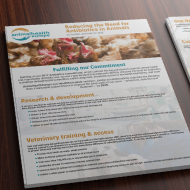AnimalhealthEurope pledges to reduce need for antibiotics in animals

"Our pledge for further targeted actions will serve to reduce the need to use antibiotics in animals" - Roxane Feller, AnimalhealthEurope.
AnimalhealthEurope, an organisation representing manufacturers of animal medicines and vaccinations, has announced a multi-billion euro pledge to support the development of vaccines and diagnostics by 2025.
The organisation said that it will invest at least €10 billion in research and development, deliver at least 100 new vaccines and train more than 100,000 veterinary surgeons in the responsible use of medicines.
The pledge for 25 Global Actions by 2025 forms part of a global Roadmap to Reducing the Need for Antibiotics, initiated by HealthforAnimals. The Roadmap sets out three approaches to reduce the need for antibiotics in animals: disease prevention and control; earlier detection of illness; and fast, accurate treatment.
The pledges include:
- train more than 100,000 vets in responsible use of medicines and invest at least $5 million (€4.5 million) in veterinary education scholarships and grants;
- invest at least $10 billion (€9.1 billion) in research and development, and deliver at least 100 new vaccines and 20 new diagnostics tools;
- conduct an AMR risk analysis for every new antibiotic brought to market;
- strengthen communications on benefits of biosecurity, in-feed supplements, vaccinations, and products that support good animal health;
- participate in responsible use coalitions in major markets, such as the European Platform for the Responsible Use of Medicines in Animals (EPRUMA).
Roxane Feller, AnimalhealthEurope secretary general said: “In Europe coordinated efforts on awareness-raising around antibiotic resistance, and improving disease prevention and animal health management have made notable progress in reducing the need to use antibiotics in animals. Our pledge for further targeted actions will serve to boost such efforts at a global level.
“Antibiotics remain the only way to treat bacterial disease, so we cannot simply reduce antibiotic use without first improving animal health. As such, our pledge includes actions to boost veterinary training in preventive care and responsible use of medicine. As our stewards of animal health, the veterinarian’s responsibility in the AMR challenge is as critical as that of doctors and human healthcare workers. It is vital that veterinarians have access to the latest tools, knowledge and products that improve animal health and lower the risk of bacterial disease.”
She continued: “But the animal health sector cannot reduce the need for antibiotics alone. Global support from international and regional organisations in improving prevention, detection and treatment of animal disease is needed. And promoting the deployment of the broader toolbox of animal health solutions in all parts of the world, is essential to reduce the need for antibiotics in animals.”



 The Veterinary Medicines Directorate (VMD) is inviting applications from veterinary students to attend a one-week extramural studies (EMS) placement in July 2026.
The Veterinary Medicines Directorate (VMD) is inviting applications from veterinary students to attend a one-week extramural studies (EMS) placement in July 2026.